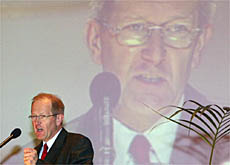Swiss are European champions in innovation

A Lausanne-based start-up, which specialises in medical technology, has won the Wall Street Journal's top award for technological innovation in Europe.
A Zurich-based researcher also won a prize, and the University of Fribourg was commended.
One of the most interesting developments in cutting-edge research in recent years is the application of physics in medical science.
This is the field of Claudio Lucchesi, the founder of Abmi (Applied BioMedical Intelligence), which was awarded first prize by the European edition of the Wall Street Journal (WSJ).
Claudio Lucchesi, who holds both Swiss and Italian citizenship, studied theoretical physics at the University of Geneva.
He has completed two post-doctoral degrees, one in Germany and one at the Massachusetts Institute of Technology in Boston.
“Medicine is a field which has always interested me and which makes me feel as though I can do something very useful,” he told swissinfo.
“While I was at university my father had three minor strokes. He’s now doing well, but this personal experience motivated me to seek better forms of treatment for people who suffer from thrombosis and other cerebro-vascular disorders.”
Product line
Lucchesi was singled out by the WSJ for a whole line of products, some already developed and some still in the pipeline.
Ready for market launch is a software programme which could be used initially by hospitals to obtain a more precise image of the brain in stroke victims.
In future, Abmi hopes to develop successfully a portable device – about the size of a personal stereo – which would help to identify embolisms in the brain.
In statistical terms, strokes are the third-highest cause of death in developed countries, after cardiac diseases and cancer.
Strokes
However, while it is reasonably easy to diagnose a heart attack, both the diagnosis and post-operative treatment of cerebro-vascular disorders are less clear.
“In terms of research, Switzerland is a very advanced country,” points out Lucchesi, “but assistance for anyone wanting to set up his own company mainly takes the form of advice. Finding the money is more difficult.”
He is hoping that the WSJ prize, which brings prestige but no cash, will encourage potential investors.
Lucchesi has personally invested SFr100,000 ($80,000) in the company, which employs another four electronic engineers. He needs at least another SFr500,000 to be able to continue developing his product line over the next few months.
Other Swiss winners
In addition to the top prize for Abmi, a silver medal was won by Speedscript, a start-up company in Zurich which developed a handwriting identification system for electronic diaries and other touch-screen devices.
And the University of Fribourg won a commendation for a device which measures magnetic fields in the human heart.
The WSJ awards appear to confirm Switzerland’s strong position in the research field and offer hope of halting the brain drain to the United States.
However, the recent shift to the right in the Swiss government brings with it the threat of cuts for certain research sectors.
Last week parliament approved record spending cuts, with funding for scientific research losing SFr378 million over the next three years.
swissinfo
Claudio Lucchesi set up Abmi using SFr100,000 ($80,000) from his personal savings.
He is developing a hand-held device to detect embolisms in the brain.
Government funding for scientific research has been trimmed over the next three years.

In compliance with the JTI standards
More: SWI swissinfo.ch certified by the Journalism Trust Initiative










You can find an overview of ongoing debates with our journalists here . Please join us!
If you want to start a conversation about a topic raised in this article or want to report factual errors, email us at english@swissinfo.ch.